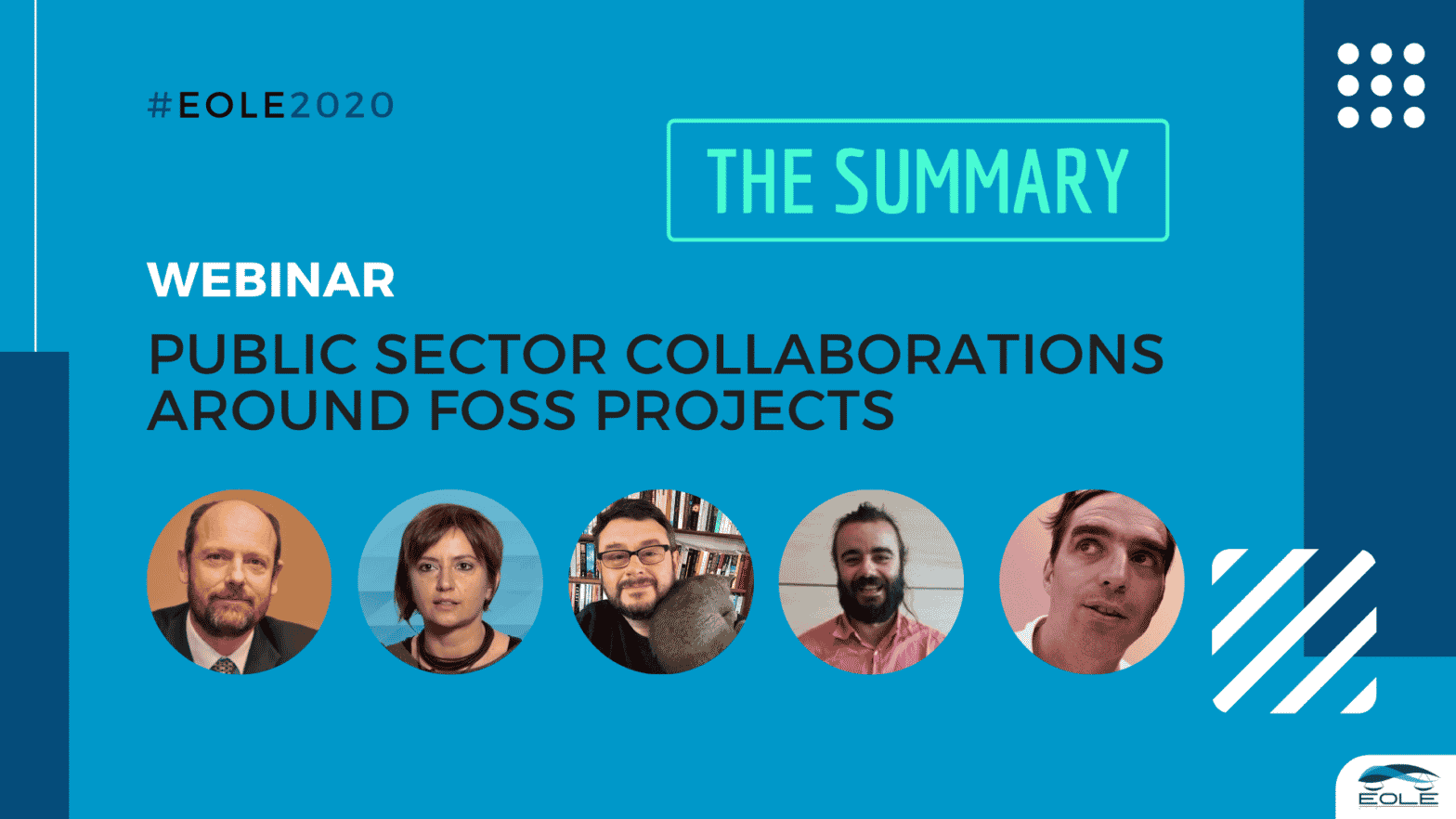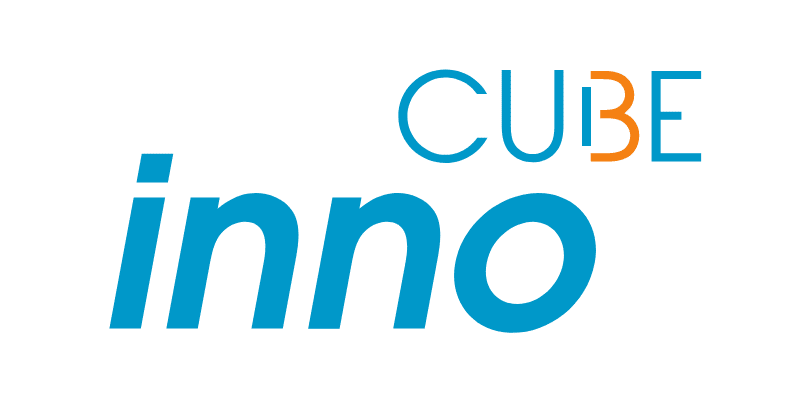
Summary of EOLE’s 2nd webinar : Public sector collaborations around FOSS projects
This webinar is part of the 13th edition of the EOLE conference which is held online this year due to the worldwide pandemic.
Initiative born in 2008 the European Open Source & Free Software Law Event (EOLE) aims to promote the share and dissemination of legal knowledge related to free software, as well as the development and promotion of good practices.
For this second webinar, which focuses on legal aspects of free software use and collaboration in public administrations, the speakers responded to the questions : How can public administrations work together? What approach should they take? The Speakers take into account past experiences and recent legal development to highlight the important aspects that need to be considered when public entities are collaborating on a free and open source software project.
This webinar is divided into the five following parts:
- Performing ICT Services through Cooperation among Public Administrations – Barbara Gagliardi
- Open source in Barcelona – from the City point of view – Marc Pérez-Batlle
- Improving code sharing between councils – Andrew Katz & Finn Lewis
- Building a Public Administration community – do we need an agreement? – Malcolm Bain
- Question time
1. Performing ICT Services through Cooperation among Public Administrations – Barbara Gagliardi
From the point of view of EU law, there is no obstacle to collaboration. Public entities as economic operators are allowed to carry out their activities through in house providing or by awarding a contract to another economic operator, this possibility is the expression of the right to self-organization of public entities.
However, cooperation is not encompassed within the “In-House providing” hypothesis. The European Court of justice recognized that cooperation is the result of an horizontal relationship between a public entity and a third party.
According to the court all the following conditions should be fulfilled to establish a cooperation:
- First of all, the contract establishes or implements a cooperation with the aim of ensuring that public services they have to perform are provided with a view to achieving objectives they have in common;
- The implementation of that cooperation is governed solely by considerations relating to the public interest.
- Finally, the participating contracting authorities perform on the open market less than 20% of the activities concerned by the cooperation.
Cooperation can cover all types of activities related to the performance of public services assumed by the participating authorities. It can also cover «ancillary activities» such as the adaptation of a software.
At the same time it also true that, for the court, the adaptation of the software is a complex concept that requires knowledge, which often only the publisher has. So according to the court, in order to comply with the EU procurement rules, this kind of ICT services cooperation requires that both parties have the source code and can communicate it to potential candidate in a tender or other parties.
2. Open source in Barcelona – from the City point of view – Marc Pérez-Batlle
This presentation focuses on the experiences of the Barcelona City Council on initiating FOSS projects. The Barcelona City Council put in place the 2015-2019 digital plan in order to promote FOSS in municipal systems and the delivery of agile, open and ethical digital services.
Several projects resulted from this Digital Plan, 3 were presented during the Webinar:
- Decidim: a praticipatory democracy platform
- Sentilo: a city sensor platform
- Ethical Mailbox: a platform created in order to denounce professional malpractice in the City.
From those experiences the advantages of FOSS projects was that the projects were replicable, cost efficient and reinforced close collaboration among local entities but also internationally.
The main impediment is having to create a source code that will be easily adaptable to the needs of different local entities. Community engagement was also one of the main difficulties.
3. Improving code sharing between councils – Andrew Katz & Finn Lewis
The LocalGov Drupal Project : This FOSS project started with two UK city councils deciding to share code to create their website. This initiative combined with the funding from Local Digital Fund by the Ministry of Housing communities and local government, helped LocalGov Drupal come to life.
Councils mentioned that they encountered the same issues, which collaboration could help solve in a more efficient way. They wanted to collaborate under a lightweight agreement in order to have a clear and simple roadmap, which is where the memorandum of understanding comes into play.
The Memorandum of Understanding (MoU) : This document is not binding. It was thought out in order to simplify collaboration. Councils needed a simple agreement to present to their management teams. The document is divided into sections, underlining the great principles of the collaboration:
- Values: Open culture, working in the open, sharing, working collaboratively. They also recognized that they were part of an international movement and community, hence anybody is welcomed to reuse the code.
- Intellectual property and licensing: The licence is open source. For the code, as Drupal was under GPL v2 or later, they decided to maintain this license. The documentation is shared under creative commons. Potentially other aspects could be licensed under GPL V2.
- Governance: It was thought to be a lighter weight mechanism, the administrative body is split into a technical group and a product group.
- Commitment : There is no financial commitment, the commitment is considered in terms of resources and time. Anybody can leave at any time.
Two councils have now launched their websites. In the coming year they are hoping to push for more accessibility and functionality. They also hope that the successful example that is Drupal will help get more councils involved.
4. Building a Public Administration community – do we need an agreement? – Malcolm Bain
This presentation highlights 3 projects: Sentilo, Decidim, GDMatrix in order to analyze the possible types of agreement and structures that can be used in FOSS projects.
Sentilo, which was mentioned before, has set up a government structure with technical committees, product committees and even a membership committee, however, there is no formal agreement. The cities which want to participate just have to send a letter to express their wish to be part of the Sentilo community and they can just download the code which is developed on GitHub. The agreement is very lightweight, there are government documents but there isn’t an umbrella agreement managing the collaboration. Everything is on a voluntary basis, which may be the source of some challenges, as there can be a lack of structure and governance.
Decidim, which was also mentioned before, had an approach which was quite the opposite of the Sentilo approach. From the beginning, there was a very strong social contract which set the rules of collaboration. This project was then divested. The city of Barcelona handed over the management to a private association (non profit) in Catalona, under a private public partnership agreement between the city of Barcelona, the regional federation of councils and the association. Now in order to join, an interested party has to send a private letter to join this contractual arrangement.
GDMatrix is a recent project, it was initiated to create an internal document management system. GDMatrix has been built over the last 7 years, and has been shared with other cities with formal contractual arrangements. It is licensed to other cities, with no other obligation towards collaboration. The model was very centralized and hierarchical.
This project will go public and they currently have to decide which framework to adopt. They could choose either a more relaxed framework resembling the Drupal MoU or a more formalized agreement that cities can adhere to. The latter would allow the project to be sponsored by the provincial government (Diputació de Barcelona).
5. Question time
Three main points were raised during this interaction. The first one being that there is a need for an agreement. The type of agreement will depend on the project and the need of the people who collaborate. From a legal point of view, a formal agreement is often better, as it sets a strict framework and complies with the legal requirements of collaboration between local entities.
Another point that was raised was that there is a need to bring more awareness of the law among the communities that initiate FOSS projects. As there is a legal obligation to search for pre-existing solutions, a change in mentality is needed to make sure that looking into common repositories is the first step to any FOSS project.
Finally, all the speakers agreed on the fact that the only way for those projects to be successful is through community and people, hence personal skills and communication are central to the success of FOSS projects.
Auteur/Autrice

Collectif inno³
Ressources associées
